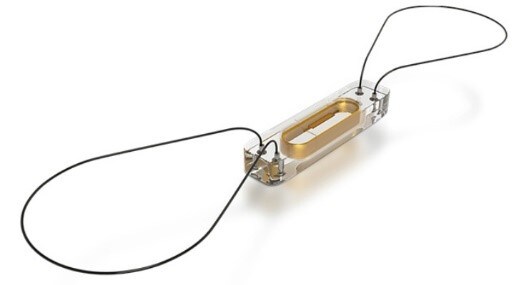Silver Cross 1st to Offer Patients a New Heart Failure Monitoring System
Silver Cross Hospital is the region’s first hospital to offer a new miniaturized, wireless monitoring sensor to manage heart failure. The CardioMEMS Heart Failure System is the first and only FDA-approved heart failure monitoring device that has been proven to significantly reduce hospital admissions when used by physicians to manage heart failure.
 On April 9, cardiologist Hong Jun Yun, M.D., successfully implanted the CardioMEMS devices in a 66-year-old male and a 64-year-old female, both diagnosed with congestive heart failure.
On April 9, cardiologist Hong Jun Yun, M.D., successfully implanted the CardioMEMS devices in a 66-year-old male and a 64-year-old female, both diagnosed with congestive heart failure.
The innovative CardioMEMS system at Silver Cross features a sensor that is implanted in the pulmonary artery (PA) during a non-surgical procedure to directly measure PA pressure. Increased PA pressures appear before weight and blood pressure changes, which are often used as indirect measures of worsening heart failure.
The CardioMEMS system allows the patient to transmit critical information about their heart failure status to a clinician on a regular basis, without the need for additional clinic or hospital visits. This enables clinicians to detect worsening heart failure sooner and adjust treatment to reduce the likelihood that the patient will need to be hospitalized.
“Silver Cross is committed to providing exceptional patient care,” adds Silver Cross Hospital President and Chief Executive Officer Ruth Colby, “and that includes investing in innovative medical technologies like CardioMEMS that help improve outcomes and reduce hospitalizations for patients with heart failure.”
Heart failure occurs when the heart is unable to pump enough blood to meet the body’s demands. According to the American Heart Association, nearly 6 million Americans have heart failure, and 900,000 new patients are diagnosed each year. Patients with heart failure are frequently hospitalized, have a reduced quality of life and face a higher risk of death; in fact the Centers for Disease Control and Prevention estimates that half of heart failure patients die within five years of diagnosis.
Heart failure is the leading cause of hospitalization for Americans over the age of 65. According to the American Heart Association, the estimated direct and indirect cost of heart failure in the U.S. in 2012 was $31 billion, and that number is expected to more than double by 2030.
The CardioMEMS sensor is designed to last the lifetime of the patient and doesn’t require batteries. Once implanted, the wireless sensor sends pressure readings to an external patient electronic system. There’s no pain or sensation for the patient during the readings.
Clinical trial data showed that CardioMEMS technology reduces heart failure hospital admissions by up to 37 percent in patients with Class III heart failure and improved quality of life and the ability to exercise.